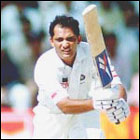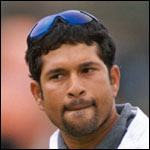BCCI versus CBI - II
The Rediff Team
Herewith, the second part in an ongoing series that compares the CBI indictment of the BCCI, the board's defence, and the real facts.
The CBI claims that the unavailability of the national players to play in the domestic fixtures due to the packed cricket schedule is the reason for declining domestic cricket standards.
The BCCI counters, claiming that it is mandatory as per the board's rules for national cricketers to play for their respective affiliated units or zones when he is not on national duty.
To further set the stage, we present excerpts from a conversation Faisal Shariff had in November 1999 with P M Rungta, former President of the BCCI (1973-'75).
Sir, don't you think that the players should be asked to play in domestic games?

Yes, they have to. When I was in charge, I saw to it that they took domestic cricket seriously. The players had to give a written explanation as to why they are not participating in the games. If their explanation was not considered valid they were taken to task. Even Azhar, when he was not captain, was taken to task when he missed a game.
Then why was it that for all these years he didn't bother playing these games? Did you know that last year, when Haryana was playing in the quarter-finals, Ajay [Jadeja] was in the same city playing golf at the local golf course?
I cannot comment on that. I think if players ignore domestic cricket, they should be penalised and warned about it. Strict action should be taken against them.
Here is the CBI charge, and the BCCI counter, in full:
The CBI case against the BCCI:
Moreover, due to the extremely busy schedule charted out for the national players, they hardly get any time to participate in domestic cricket matches. This has led to a decline in the standards of domestic cricket, as a result of which hardly any players of international standards are being thrown up.
The off-shoot is that the reserve strength of the Indian bench is pathetic when compared to countries like Australia who can put up a world class side from their reserve strength itself.
With their positions of strength and lack of fresh talent, it is only natural for members of the Indian team to become complacent and more susceptible to the lure of match fixing etc as their position would not be under threat for lack of performance in a few matches.
2) The BCCI's arguments in defense:
The presence of international cricketers in the domestic teams undoubtedly encourages junior cricketers. The CBI does perhaps not know that it is mandatory for a national cricketer to play for his respective affiliated unit or zone when he is not on national duty, as per the Board's Rules.
Moreover, the comment that the absence of the international players in domestic cricket has resulted in a decline in the standards of domestic cricket and international players are not being produced is far from the actual facts. In the last three years, cricketers like V.V.S. Laxman, Yuvraj Singh, Zaheer Khan, Shiv Sundar Das, Debashish Mohanty, Jacob Martin, Robin Singh (Junior), Amay Khurasia, Devang Gandhi, S. Sriram, Hemang Badani, Vijay Dahiya, Mohammad Kaif, R. Vijay Bharadwaj, Murali Kartick, Sharandeep Singh, Rahul Sanghvi and others have played for the country. There are several players who are waiting in the wings to knock at the doors for national appearance. Ritender Singh Sodhi, Amit Bhandari, Venugopal Rao, Niraj Patel, Ajay Rathra, Arjun Yadav, Ravneet Ricky, Anup Dave are just to name a few and the list is not exhaustive.
Therefore, the strength available in the reserve bench of India is rather attractive, contrary to being "pathetic", as stated by CBI. India was in fact, the only country that could send two parallel teams of equal strength for the Commonwealth Games in Kuala Lumpur and the Sahara Cup in Toronto in September 1998.
These players have come up to the national scene by dint of their performances in the domestic circuit. In fact, the very circumstances mentioned in the CBI report ensure that emerging players get the opportunity for their respective Ranji Trophy teams. As more and more youngsters get a chance, the talent available for selection at the national level also becomes greater. It is a fact that the present policy is paying rich dividends with regard to discovery of new talent. The National Cricket Academy established by the Board would further augment this positive process.
3) The facts of the case
| PLAYER |
YEAR |
TEAM |
| 1997-98 |
1998-99 |
1999-00 |
| S Ganguly |
2 (8) |
2 (8) |
1 (8) |
Bengal |
| S Tendulkar |
3 (9) |
1 (4) |
2 (10) |
Mumbai |
| R Dravid |
8 (11) |
1 (11) |
1 (10) |
Karnataka |
| A Jadeja |
3 (10) |
2 (9) |
0 (9) |
Haryana |
| M Azhar |
2 (11) |
0 (11) |
8 (12) |
Hyderabad |
| A Kumble |
6 (11) |
0 (11) |
1 (10) |
Karnataka |
| J Srinath |
5 (11) |
0 (11) |
1 (10) |
Karnataka |
| Note: Figures in parentheses indicates the number of matches played by the team during the season. |
The above table tells its own tale.
 It will be clearly seen that international players have not turned out for domestic matches as the Board claims. With the exception of Sachin Tendulkar and Sourav Ganguly, who have never missed a game when not on national duty in the last three years, all the other leading players have missed games despite being available.
It will be clearly seen that international players have not turned out for domestic matches as the Board claims. With the exception of Sachin Tendulkar and Sourav Ganguly, who have never missed a game when not on national duty in the last three years, all the other leading players have missed games despite being available.
Azhar did not play a single game in the 1998-'99 season despite being available. Ditto Ajay Jadeja in the last season. Likewise, Kumble and Srinath did not play a single game out of the ten fixtures Karnataka played in '98-'99, and played just one game out of eleven in '99-2000.
The board says that it is mandatory for national players to play domestic. If so, what action has been taken against the defaulters?
The answer, in one word, is none. Never, ever.
Now for the question of bench strength:
The board says that its bench strength is so good that it was the only team that could actually send out two teams at the same time for international contests. Which is downright laughable -- the Board found itself in a fix, where it was scheduled to play two tournaments at the same time, did its best to wriggle out of one of the commitments and when those attempts failed, sent what it called "equal strength" teams to Toronto and Kuala Lumpur. Both teams lost. So much for that.
Examine the table given below:
| PLAYER |
TESTS |
ODI's |
| Matches |
Debut |
Last Played |
Matches |
Debut |
Last Played |
| VVS Laxman |
11 |
November 96 |
November 00 |
13 |
09-04-98 |
30-01-2000 |
| Yuvraj Singh |
Nil |
- |
- |
12 |
03-10-00 |
08-12-2000 |
| Zaheer Khan |
2 |
November 00 |
November 00 |
12 |
03-10-00 |
08-12-2000 |
| SS Das |
3 |
November 00 |
November 00 |
Nil |
Nil |
- |
| D Mohanty |
1 |
August 97 |
November 97 |
0 41 |
13-09-97 |
26-01-2000 |
| J Martin |
Nil |
- |
- |
8 |
11-09-99 |
28-01-2000 |
| Robin Singh Jr |
1 |
January 99 |
January 99 |
Nil |
- |
- |
| A Khurasiya |
Nil |
- |
- |
10 |
30-03-99 |
05-09-1999 |
| D Gandhi |
4 |
October 99 |
December 99 |
3 |
17-11-99 |
30-01-2000 |
| S Sriram |
Nil |
- |
- |
4 |
19-03-00 |
05-12-2000 |
| H Badani |
Nil |
- |
- |
6 |
30-05-00 |
08-12-2000 |
| V Dahiya |
2 |
November 00 |
November 00 |
12 |
03-10-00 |
08-12-2000 |
| M Kaif |
1 |
March 00 |
March 00 |
Nil |
- |
- |
| V Bhardwaj |
3 |
October 99 |
January 00 |
9 |
26-09-99 |
17-11-1999 |
| M Kartik |
4 |
March 00 |
November 00 |
Nil |
- |
- |
| Sarandeep Singh |
1 |
November 00 |
November 00 |
Nil |
- |
- |
| R Sanghvi |
Nil |
- |
- |
10 |
18-01-99 |
September 98 |
Now examine the BCCI defence more closely. In its list of young players inducted into the team, the BCCI mentions 17 names. Of these, Yuvraj, Zahir, SS Das, Sriram, Badani, Dahiya, Kaif and Sarandeep Singh -- 8 players in all out of 17 -- were inducted into the team after the CBI report was published. And after the furore broke out. Hence, those names become irrelevant to the BCCI's own defence.
What then of the others? Take a closer look at the table given above. There is, first, the example of VVS Laxman. If the BCCI bench strength was outstanding, as it claims, why then was it faced with a situation where it could not find a single bona fide opener? Why did it have to promote -- and in the process ruin -- a fine middle-order batsman to the opener's slot?
For the rest -- Mohanty has played one Test in three years. Robin Singh Junior, one Test in two years. Devang Gandhi, four Tests a year ago, and now not even part of the selectors' consideration -- what does that tell you about his selection for those Tests? Vijay Bharadwaj has played three Tests -- and is now not even considered for board president's XIs and suchlike.
Bench strength? The BCCI mentions Sarandeep Singh as an example of its bench strength. Is that why Singh, having performed creditably in his first and thus far, only, Test, was promptly sidelined in favour of an Ashish Kapoor, who makes a comeback after five years and 157 matches?
Bench strength is defined as reserve strength capable of taking over when the main players are out either through illness or injury. In other words, players capable of picking up the baton and running with it, and possessed of sufficient talent to adequately fill the gaps in the team.
In context of that definition, look at the BCCI's own list. And ask yourself this -- if Sachin, Saurav, Dravid, Srinath and Kumble were to be struck by some virus tomorrow and find themselves hors d'combat, who will the BCCI pick to fill those five slots?
In other words, where is the bench strength the BCCI claims to possess?
The series resumes tomorrow.
The Series
Part I - One dayers versus Test cricket
Part III - Transparency in appointment of coaches and managers
Part IV - A question of appointments
Part V - The Sharjah Syndrome
Part VI - Keeping it in the Rungta family.